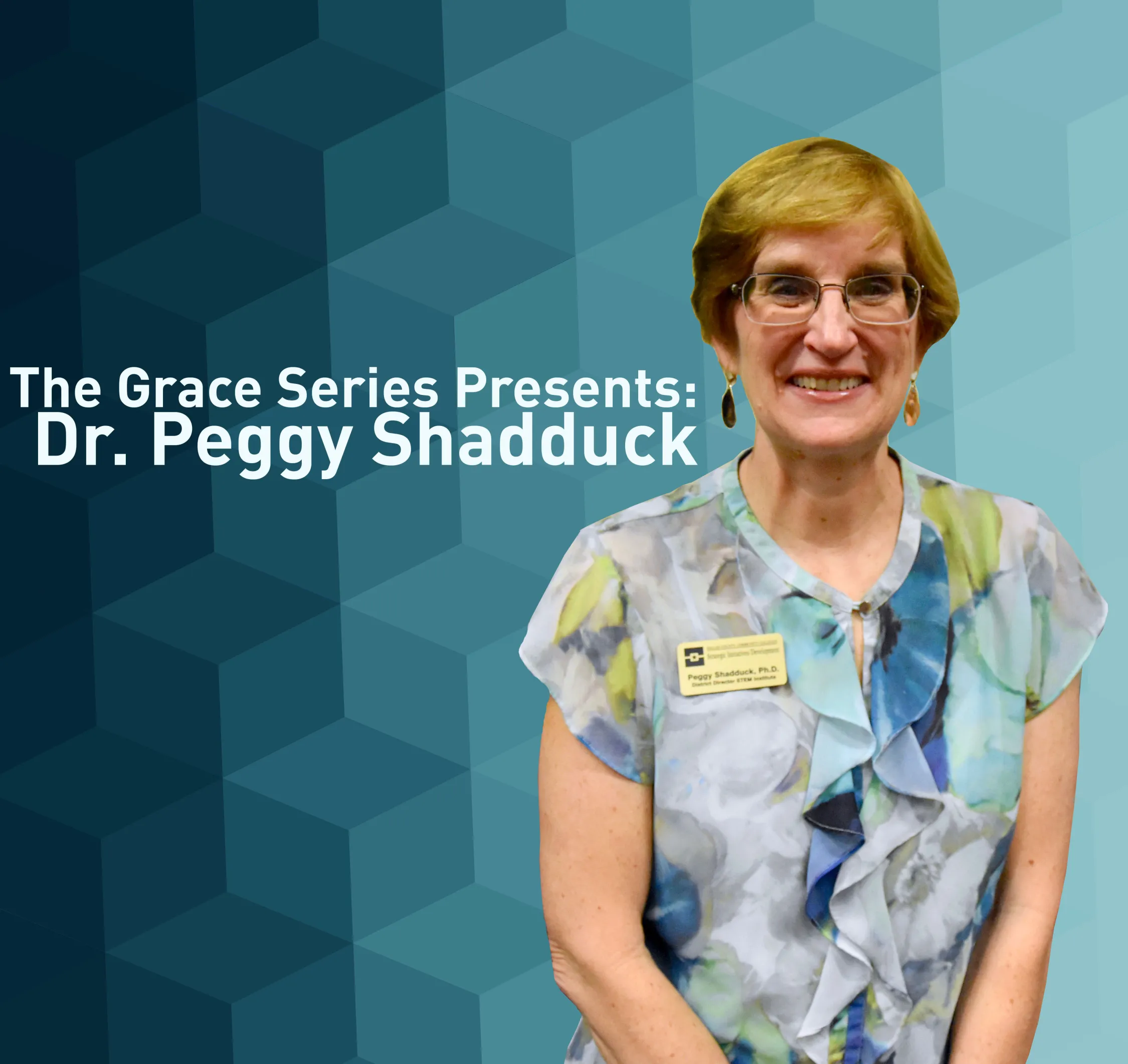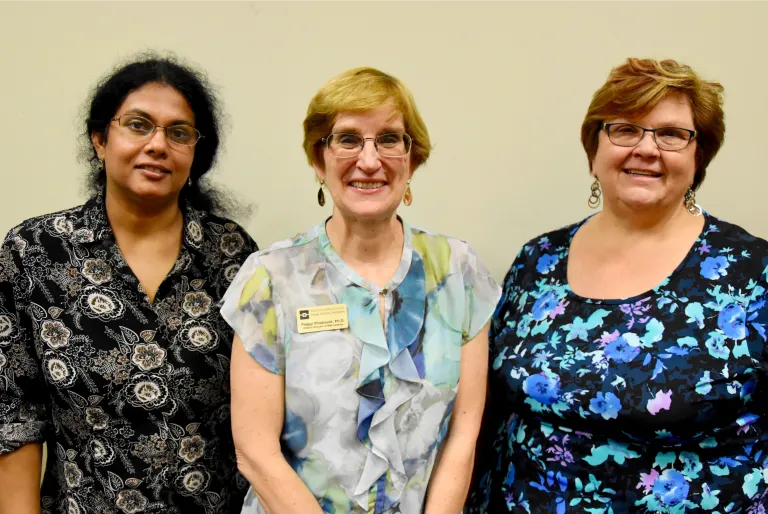The Spring’17 Grace Series Continues to Empower With Dr. Peggy Shadduck, DCCCD STEM Institute Director

The Spring 2017 run of the Grace Series carried on with its second speaker, Dr. Peggy Shadduck, Director of both the Dallas County Community College District (DCCCD) STEM Institute and the Dallas/North Texas STEM Degree Accelerator Program. Last February, Dr. Peggy Shadduck’s Grace Series talk, “Loving The Journey: How To Take Advantage Of Unexpected Turns In Your Career,” drew a room full of both faculty and students who were eager to learn and discuss with Dr. Shadduck about how to take advantage of unexpected twists and turns that can transpire in ones career in and out of school, all while drawing on her own past experiences.
The Grace Series Talks feature a wide range of speakers including UT Dallas Computer Science and Software Engineering alumni, UT Dallas CS/SE professors, as well as other distinguished female technologists in the field. Drs. Pushpa Kumar, Janell Straach, and Linda Morales conceived the idea of the UT Dallas Grace Series as a result of attending the Grace Hopper Celebration of Women in Computing (GHC) Conference a few years ago. The conference, fittingly named after the woman who helped pioneer computer programming, Rear Admiral Dr. Grace Murray Hopper, involves a series of presentations designed to bring research and career interests of women in computing to the forefront. Every year, GHC brings together the community of women technologists, highlighting the best minds in computing and spotlighting the contributions of women to computing. The UT Dallas Computer Science Grace Series lectures are fashioned after the GHC Conference format.
Last semester, the UT Dallas CS department had 36 CS/SE students participate in the Grace Hopper Conference, and almost all the young women came back with not only inspiring stories but job offers, interviews for jobs, and internships. You can read more about the student’s experiences by clicking here.
The evening began with warm welcomes and opening remarks from both Drs. Pushpa Kumar and Gopal Gupta. Dr. Pushpa Kumar began the talk with her segment titled, “The Facets of Empowerment.” During this segment, she discussed leadership by showing Sheryl Sandberg, Facebook’s Chief Operating Officer (COO) and Founder of Leanin.org, and then introducing DCCCD Stem Institute Director and the 11th Grace Series Speaker, Dr. Peggy Shadduck. During her talk, Dr. Shadduck spoke directly to the students by drawing on personal stories about how to approach obstacles that might come and interfere with the career plan that they have already mapped out.
“One of the reasons I came here to talk to you all here today is to show you that some of those things that might seem like really big barriers and you’re asking yourself how am I going to make this decision, is it surmountable? Well, yah! I am still alive and still smiling!” Dr. Shadduck continued on saying, “That chaos that happens early on and the decisions where you think ‘oh my, am I doing the right thing?’ You are going to find a way to come out ok in the end, it may not be your original plan, but you can adjust.”
Dr. Shadduck started her talk by drawing on the early years of her career and how things did not exactly go as she had planned but by accepting the chaos in the early years, she was able to experiment and find new things about herself. After earning her undergraduate degree from Oberlin College with majors in mathematics and East Asian studies, Peggy began her STEM career by working as an actuary. Curiosity about scientific subjects, though, led Peggy to go back to school, earning a master’s degree in neuroscience from Northwestern University and a Ph.D. in pharmacology from Southern Illinois University.
After a post-doctoral fellowship on computer-modeling of age-related hearing loss, Dr. Shadduck realized she had a tremendous passion for teaching and she began focusing her career on undergraduate students. She taught classes and did neuropharmacology and education research projects at a small liberal arts college where she was recognized with several teaching awards, including the CASE/Carnegie Kentucky Professor of the Year in 2005.
Throughout her career, Dr. Shadduck has taken on numerous roles of leadership including being the first woman to be Chair of the Division of Natural Sciences and Mathematics at Transylvania University, being a divisional dean and then as the chief academic officer for two community colleges. Dr. Shadduck currently serves as the Director of the Dallas County Community College District (DCCCD) STEM Institute and Director of the Dallas/North Texas STEM Degree Accelerator Program.

Since the inception of the UT Dallas Grace Series in the spring of 2015 a total of eleven inspiring women have spoken, including: Drs. Bhavani Thuraisingham (click here for her story), Lily Wu (click here for her story), I-Ling Yen (click here for her story), Ranran Feng (click here for her story), Sanda Harabagiu (click here for her story), Rym Zalila-Wenkstern (click here for her story), Dr. Inga H. Musselman (click here for her story), and distinguished industry technologists like Dr. Jo Zhang of Fujitsu Laboratories of America (click here to read her story), Lymari Ames of Cisco Systems (click here to read her story), Romelia Flores a IBM Distinguished Engineer and Master Inventor (click here to read her story), and Dr. Peggy Shadduck, Director of both the Dallas County Community College District (DCCCD) STEM Institute and of the Dallas/North Texas STEM Degree Accelerator Program.
ABOUT THE UT DALLAS COMPUTER SCIENCE DEPARTMENT
The UT Dallas Computer Science program is one of the largest Computer Science departments in the United States with over 2,100 bachelor’s-degree students, more than 1,000 MS master’s students, 150 PhD students, and 86 faculty members, as of Fall 2016. With The University of Texas at Dallas’ unique history of starting as a graduate institution first, the CS Department is built on a legacy of valuing innovative research and providing advanced training for software engineers and computer scientists.




